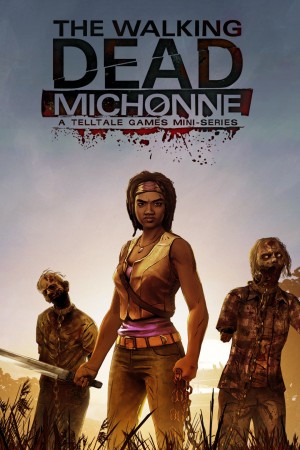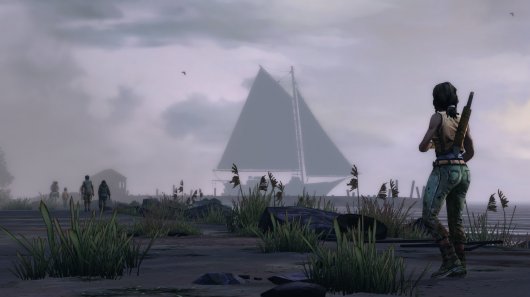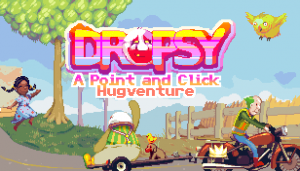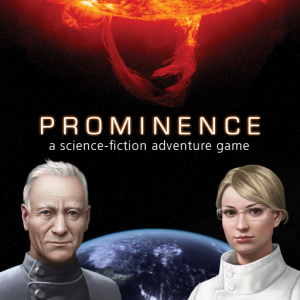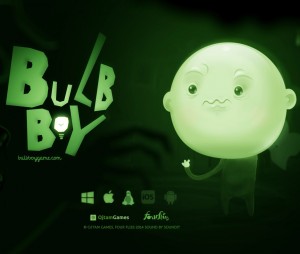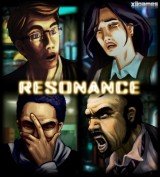Review for The Walking Dead: Michonne
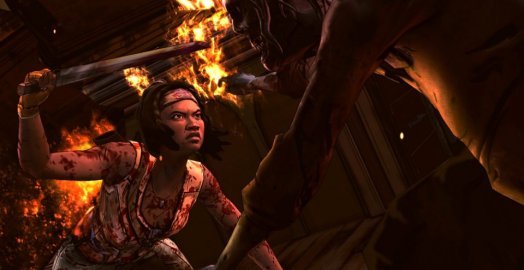
Game information
Adventure Gamers Awards
Episode One - In Too Deep
I’ve never been one for zombies. To me, they’ve always seemed like an overdone, boring concept. But when Telltale Games released their first season of The Walking Dead, I was hooked. Here was a gripping and powerful story that contained zombies, but at its heart was about the relationships between the human survivors. The people trying to get by in this devastated world and the way they interacted was what drew me in – their clashes, their bonds of blood. You probably know the tale, but for Telltale it sparked huge accolades and attention that their previous releases hadn’t garnered. And it was fully deserved, though it marked the beginning of the company’s move away from traditional gaming to largely story-driven content.
Fast forward four years and we’ve had two full seasons and one interim episode in total. Now comes the release of The Walking Dead: Michonne, a standalone trilogy that focusses on the titular character as she battles with demons both external and internal. Fans of the comic book or TV series will know who Michonne is, and the game purportedly explains the character’s absence during a certain period of the comic. But you don’t need to have any familiarity with the source material. I certainly don’t and it didn’t diminish my experience at all.
For those similarly not in the loop, Michonne is an initially steely, closed-off woman who is not to be messed with. In this first episode, In Too Deep, we meet her in a superb introduction sequence, where her past and present combine into one grand horror. Flicking back and forth between the wilderness and a dark apartment, Michonne dispatches walkers with her katana while simultaneously being haunted by a memory of her children. You see them playing, but they’re always just out of reach before running away. Though we’re not told specifically what’s happened, there’s clearly deep regret in our lead protagonist’s soul.
This sequence is a thrilling, intriguing opening that is masterfully produced. At one point a door appears in the foliage, which the player has to open, and it’s a clever juxtaposition. Once through and inside, you’ll discover a campfire present in both the wilds and the apartment. With cinematic camera angles and tense music used to great effect, it’s a killer way to become acquainted with this world and character – I instantly wanted to know more about this woman's story.
All the while you’re re-killing the undead, which involves numerous Quick Time Events. When indicated, you’ll need to tap keys, follow the directional arrows and move the mouse (or use the corresponding gamepad controls) under duress. If you’ve played a modern Telltale game, you know what to expect. Personally, I don’t mind them, and I think they help move the action along, but if you’ve not been convinced by this type of gameplay in the past, your mind won’t be changed here. The prompts are blended into the world, which is a nice touch, like being angled against the scenery or splattered with blood. There’s at least one moment where you have to quickly tap keys, but it’s nothing too taxing.
And then comes the first player decision. Back in the present day, Michonne looks around and sees walkers continuing to slump around. With a single bullet left, she first points it towards the group. But then, on her knees and coated in blood, the gun barrel comes up against her head. Is this really a life worth living? As the timer quickly runs out, the choice is yours: lower the gun or pull the trigger?
For me, this was one of the most meaningful choices of the episode, the other coming at the end. And not because it actually impacts anything – it obviously can’t, apart from a brief dialogue exchange later on. It’s not spoiling anything to say that you’ll still play as Michonne regardless of which option you select, but it instantly puts you up against a tough, gritty call. It completes the scene perfectly and dramatically sums up her desperation: This is a character who has obviously been through so much and we’re meeting her at one of her lowest points.
Choice is a device used in all of Telltale’s games, but they’ve still yet to overcome its largely illusory nature. It seems all the more pointless in some of the decisions you make here, because as of now the majority of them have little-to-no impact on the story either way. Perhaps they’ll pay off later on, but even if they do, without the standard five-episode story arc to pace things out like the main seasons, it would have been nice to see some more immediate consequences.
That’s not to say your selections are entirely meaningless, just that the results aren’t far-reaching. In one scene you have to decide how to enter a ferry, but ultimately you end up in the same place after a few minutes anyway. Later, in an intense situation where you can lash out or keep your cool, the actual difference in consequence is so minute that it seems like a choice was inserted just for the sake of it. Perhaps there’s something to be said simply for having options to do to things differently, but in this twisted universe you’re often stuck with an unwanted singular outcome, which isn’t much fun for people who want to experience unique replays.
Michonne eventually ends up at sea with a small band of men, each of whom is briefly introduced, before our heroine and crewmate Pete set out to investigate a distress call nearby. Pete is a cheerful chap who always tries to see the positive, which contrasts nicely against Michonne’s mostly bleak outlook and quiet demeanour. Their relationship is still in its beginning stages and hopefully we’ll continue to see it fleshed out because they have a good dynamic together. Once the pair reach land, it’s not long before everything starts going a bit haywire, as is customary in the land of the living dead.
It’s here where things take a turn for the underwhelming. If this is the first time you’ve touched a Walking Dead game then it won’t be much of a problem, but there’s nothing particularly innovative or special about the plot that follows. Michonne and Pete accidentally get tangled up with some questionable folk who are running their own settlement and don’t take kindly to strangers, but this is territory that’s been covered before. Randall and Norma, the pair in charge of this community, are just archetypes. He’s a violent bully, she’s a manipulative talker. I didn’t particularly connect with the others Michonne was with, partly because we don’t know enough about them, which means that some moments don’t have the emotional oomph that they should.
In Too Deep is at its best when it’s exploring the protagonist’s mind. The limited times when you get to discover more about Michonne’s life are some of the most interesting. There’s one particular scene, about mid-way through the story, when she begins to confuse reality again. It’s a genuinely creepy and disturbing sequence. Not only is it visually unsettling, but you begin to see Michonne break down. Normally there’s a wall up, but here her eyes widen and she speaks in a panic. If the next two episodes move away from the conventional story beats and do some further delving into the lead and her relationships with others, this abbreviated trilogy will be all the better for it.
Samira Wiley provides the vocals for Michonne, offering a contemplative, strong and sometimes even fierce performance. It’s not a particularly easy role to pull off due to Michonne’s often defensive personality, but Wiley draws you in and helps you bond to her character as she demonstrates both determination and hints of vulnerability. Of the supporting cast, Zachary is a clearly conflicted guy, the uncertainty coming across well in his wavering voice. I also particularly liked Randall, who would almost sound warm if everything he said wasn’t so vicious, which lends a creepy quality to his character.
Jared Emerson-Johnson, Telltale’s regular composer, is back again to provide his consistently brilliant work. I think music often works best when you’re not consciously aware of it, just blending in to complete the atmosphere, which is often what happens here. There are tense scenes where the tempo ramps up, with different elements quickly building together to reflect the pressure on-screen. Elsewhere, in more reflective moments, there’ll be soothing and echoing synths or a guitar slowly being picked. All of it is excellent and it’s easy to take it for granted, but it’s fully worthy of praise.
Visually, Michonne is as impressive as the series has ever been. Everything is drawn with a thick ink-lined style and covered in a layer of grime, looking appropriately straight out of a comic book. Detail is nicely presented in some places, such as outside a seemingly abandoned ship, where crows squawk away as you approach while crabs scuttle along the ground. Elsewhere, amongst the make-shift settlement, fairy lights are hung up, chairs are mismatched and windows are smashed, which all lend to the convincing ramshackle appearance. Being by the sea, though not always moving on it, also helps create a distinct atmosphere compared to what we’ve seen before.
There are a few times when you get to move around the environment and interact, but exploration is kept to minimum. Even in these situations, you often just have to click on everything until the scene progresses. I don’t mean that to sound dismissive, because you’ll often look at interesting things or find other characters to talk to, but you don’t really have control over where you’re going next. There’s also nothing resembling an actual puzzle, this being very much an interactive story rather than a traditional adventure. It’s also worth noting that on the PC I got absolutely no stuttering while playing, which is a problem that has plagued my console experiences with Telltale.
Clocking in at around an hour and a half, I felt satisfied with In Too Deep, but not overwhelmed. The ending does seem to come a bit too quickly and I wasn’t expecting the credits to roll quite at the moment they did, though it does make for an intriguing cliffhanger. Hopefully the next two episodes take us down a more unique plot path than what we’ve seen so far, instead spending more time exploring Michonne’s psyche. Nevertheless, this debut episode stands strong in all other aspects, like the bold visuals and top-tier voice acting, and fans of zombie violence will be well-satiated. If you’ve enjoyed Telltale’s previous Walking Dead output, you’ll find this an enjoyable though familiar journey so far.
Episodes Two and Three: Give No Shelter and What We Deserve
With Telltale’s three-part miniseries now concluded with the release of Give No Shelter and What We Deserve, the second and third episodes respectively, I’m still not entirely convinced this was a story that needed to be told. Perhaps that’s because it’s impossible not to compare it to the two full Walking Dead seasons – the superb first season especially – or maybe the novelty is just wearing off, but unlike its predecessors, I don’t feel like Michonne is going to stay with me and play on my mind. But that’s not to discredit the abbreviated experience as a whole, as it’s still something that I enjoyed while it lasted.
Give No Shelter picks up right where we left the gang, who then waste no time in attempting to escape from captivity. After an expected struggle involving opposition from violent humans, hungry walkers and even unstable structures, they eventually make their way to the family home of Sam (the young woman Michonne and Pete met previously on the abandoned ship) – a temporary safety, since Randall is in pursuit. It’s here that we’re introduced to Sam’s family; they’ve suffered a great loss of their own in the past, though due to the horrors of human illness rather than anything undead.
It seems harsh to say, but it’s hard to actually care about the family. I can’t even remember their names. Beyond understanding that they’re upset and suffering, there’s barely any development. That’d be fine if their appearance was fleeting, but you stick with them into the third episode too. The Walking Dead games have actually made me cry in the past, which was a video game first for me, but here the story is too rushed for any meaningful relationships to form or for consequences to have much impact.
Death is something ever-present in this world, of course. When it becomes gratuitous it loses all meaning, but in Michonne it’s mostly handled well. There are some deaths that are dependent on choices you make, which is great. They perhaps don’t alter the course of the story in the grand scheme of things, but it shows that your decisions do have an impact. However, there’s one particular death which is extremely poorly done. A character does something for which there’s no logical reason to do, and the moment they do it, you know they’re dead. It’s predictable and, frankly, narratively lazy; a death served only to advance the plot in a particular direction.
Eventually Randall catches up with Michonne, but this time he’s done with the niceties – he’s come with backup and is looking for blood. And blood certainly gets spilt in a brief but vicious fight, with some truly gruesome moments. I’m hesitant to praise something for its unique violence, but carnage is an innate part of The Walking Dead experience, so if that’s what you’re here for then you’ll likely be satisfied. There’s also a memorable exchange involving a flare gun, but one of the most shocking and disgusting sequences comes in What We Deserve. It’s not one for the squeamish and is unflinchingly cruel, though chances are you’ll think it’s warranted.
Understandably, not everyone is a fan of Quick Time Events, but they continue to be employed to great effect in this series. The action scenes throughout are thrilling affairs. Part of this is due to the fact that Michonne is more than capable of taking care of herself, meaning you really get to kick some zombie ass. But it’s also partly down to the stunning presentation. Throughout all of the high-octane set pieces I felt totally involved due to the snappy pace, close-up camera angles and great use of visual and audio effects.
For example, during a particularly intense section of one fight, the screen starts blurring at the edges and there’s a constant ringing. This focusses your attention entirely on what’s playing out in front of you and helps simulate what the adrenaline rush of such a situation would probably feel like. There’s another part I particularly liked when Michonne is running down a corridor, trying to reach her children, and the screen begins shaking as they slip further out of reach. These are just a couple of examples, but the presentation is really strong throughout.
Speaking of Michonne’s hallucinations about her children, they get even more pronounced as the story progresses. We learn more about what happened to them by re-enacting key moments from our heroine’s past, along with times when fantasy blends into reality. These instances are often more disturbing than anything zombie-related. The children will run past the frame unexpectedly, which made me jump on more than one occasion, and appear in silhouette, which gives them a haunting quality. We get to delve deeper into Michonne’s psyche, which is more interesting narratively than what’s going on outside her head, but there were a few times that I thought we were walking on ground already trodden. Nevertheless, exploring more of Michonne’s backstory answers at least some questions and offers a resolution of sorts, which is appreciated.
The same can’t be said for a lot of the other characters, many of whom are missing backstories. Randall and Norma are prime examples. They are threatening in their own ways: Randall is full of vitriol and is an extremely nasty, intimidating piece of work. He takes a beating, but doesn’t really seem to care, which makes him even more sinister. And Norma tries a faux-nice act, but it’s clear her motivations aren’t exactly angelic either. There’s a pure dialogue scene where Michonne and Norma are bargaining, but it’s thrillingly tense due to the unpredictability of the situation. But you never get to know the intentions of this brother and sister, which is where it falls down. They want to protect themselves and their people, sure, but what turned them into who they are? How did they reach their positions of power? Why do they seek revenge so strongly? All of this and more is never addressed.
And yet, despite not shaping its supporting characters particularly well or presenting an especially unique survival story, I still found playing The Walking Dead: Michonne a fun experience. This is due mainly to the lead protagonist herself, a tortured and flawed soul who is trying her best to remain strong in the face of adversity. Events occurring around her may be fairly trite, but the background mystery of Michonne’s inner pain kept me intrigued. There’s also the stunning presentation, serving up killer (pun intended) action scenes that are tense, gory and engaging. At around three hours in length across all episodes, Michonne isn’t a long experience, and Telltale are skirting dangerously close to running their winning formula into the ground, but series fans pining for some more zombie thrills and psychological trauma while waiting for season three will certainly find some satisfaction here.




